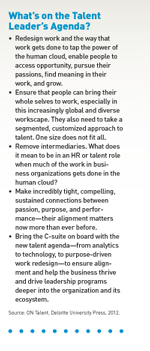TD Magazine Article
The New Talent Agenda
Human capital strategies must adapt to a new economy, world of work, and changing talent landscape.
Mon Dec 10 2012

On June 11 and 12, 21 learning and HR thought leaders and practitioners convened at Deloitte University in Westlake, Texas, to answer the question, "What's really different about the talent landscape today?" The roundtable-style discussion, called ON Talent, broached three major topics: the changing employer-employee contract, technology's impact on the way people work and the nature of work itself, and talent analytics.
"In a complicated economic environment that is creating shifts, with technology emerging and changing the way people do business, work, and engage the world, what does this mean for the talent agenda?" posed Annmarie Neal, founder of the Center for Leadership Innovation.
During the two-day collaborative event, participants attempted to answer this question and, as a result, describe the emerging human capital agenda.
"There was a strong sense among the group that we're due for a major breakthrough in talent," says Jeff Schwartz, human capital partner and global leader for human capital marketing, eminence, and brand at Deloitte. "With all that has changed in the past decade—globalization, the speed of evolving knowledge, and new technologies—and given what is going on in the world of work and in what is increasingly a social, global, and hyper-connected economy driven by innovation, we are due for a big shift."
According to Neal, participants concluded that yesterday's models no longer work for business today, and discussed practical action steps in response to this new talent landscape. For example, the learning and HR functions must step back and become more involved with the context in which their organizations create value and lead.
"There are a lot of people who sit in these roles who may not know what to do differently or might be concerned to try new and different things," Neal says. "Now is the time to be creative and progressive. Be deliberate about deconstructing and reconstructing what your organization really needs."
ON Talent participants also agreed that because a one-size-fits-all model no longer is relevant, practitioners need to think about what strategies work best for their organizations. As far as talent data and analytics, human capital leaders would do well to borrow from their marketing colleagues and implement personalization and customization strategies for different employee segments.
Deloitte University officially opened in the fall of 2011 with the mission to cultivate leader-led leadership development and be a place where ideas prosper. ON Talent was one of the university's two inaugural events in its "ON" series. The first, ON Social, examined the impact of social media and social technology on business.
[

Human capital strategies must adapt to a new economy, world of work, and changing talent landscape.
](http://files.astd.org/TD-Article-Images/2012/12/Intelligence1SB-L.png)
You've Reached ATD Member-only Content
Become an ATD member to continue
Already a member?Sign In
